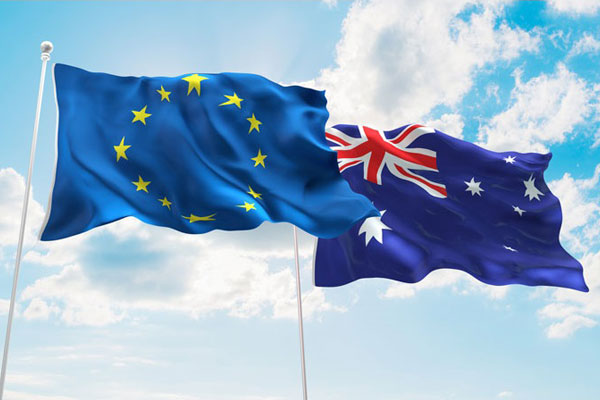Conversely in Europe, more than 60 airports are still subjected to intrusive and highly prescriptive regulatory controls at national level.
BRUSSELS – Reacting to the publication by Australia’s Productivity Commission of its final report into airport regulation1, ACI Europe highlighted how the report’s progressive, market-driven and consumer-focused approach contrasts with the way airports generally are regulated across Europe.
Airport competition reflected in Australia – Not in Europe
Taking stock of the competitive forces at play in the Australian airport market, the report published earlier this week supports the continued application of a light-handed price monitoring regime for just 4 airports in Australia (Sydney, Melbourne, Brisbane and Perth). All other airports in the country (more than 90…) are thus not submitted to ex-ante regulation. Crucially, this monitoring regime largely leaves the setting of airport charges to commercial negotiations between the airports concerned and airlines – with results being annually monitored by the competition authority.
Conversely in Europe, more than 60 airports are still subjected to intrusive and highly prescriptive regulatory controls at national level. These include the formal approval of their charges by National regulators, based on the assumption that they hold significant market power and risk abusing it – despite overwhelming evidence that airport competition has also become the rule of the game in the European market.
Olivier Jankovec, Director General of ACI Europe said: “The thorough and independent analysis of the Australian Productivity Commission should give much food for thought to regulators in Europe. Europe’s airports face even greater competitive constraints than Australian airports, amplified by the higher density of our airport network and the availability of alternative modes of transport. The fact that more than 98% of Europe’s airports today offer rebates & incentives to attract and retain airlines speaks for itself. Yet, while the European Commission has started to acknowledge these competitive pressures in its recent evaluation of the EU Airport Charges Directive2, they are often ignored or even dismissed by national regulators. The recent decisions & proposals of the Irish3, Italian4 and French5 regulators are all a case in point.”
Over-regulation risks
The Australian Productivity Commission specifically points to the risks of over-regulation and of regulators systematically looking to exert a downward pressure on airport charges. It notes in particular its “chilling effect on investment, leading to a long-term risk of increased congestion and falling quality of service” and the prospect of “incumbent airlines being able to use the system to stymie investment that would facilitate increased (airline) competition, potentially leading to higher air fares”.
Olivier Jankovec commented: “These risks are particularly relevant in the European context, given the current and projected lack of airport capacity, the significant investment that will be needed to deliver on Europe’s airport pledge to achieve Net Zero CO2 emissions by 20506 and also the fact that the airlines are consolidating. More and more airports and passengers in Europe are dependent on just one or two airlines or airline groups.”
Interestingly, the Australian Productivity Commission also confirms that airlines have weak incentives to pass through any reduction in airport charges to passengers. This confirms the analysis carried by ICF in 20187, which shows that in most cases, airlines simply pocket any reduction in airport charges, without any reduction in ticket prices for the passenger. What reduces air fares is effective airline competition – which depends on airport capacity & quality.
Olivier Jankovec concluded: “It is high time for regulators in Europe to adjust to the market realities of aviation and follow the lead of Australia. The changed dynamics of the airport-airline relationship need to be reflected. Airlines are increasingly becoming the dominant party in that relationship. They can and do exert significant countervailing power upon airports.”
1) Access the full Inquiry Report by the Australian Productivity Commission on Economic Regulation of Airports here.
2) View the ACI Europe Press Release: EC Airport Charges Report shows no misuse of airport power
3) Ireland’s Commission for Aviation Regulation (CAR) can determine the cap on the maximum level of charges, based on a determination that Dublin Airport has market power because of its share of traffic volume. The 2019 determination on charges forces Dublin Airport to reduce them by 22%, while also approving the €2 billion investment programme, which cannot be funded on such a reduction. Read the interview with daa’s CEO Dalton Philips: Facing a 22% airport charges cut: “an existential threat to Dublin Airport and for Ireland Inc”.
4) Italy’s Authority for Transport proposed revisions to the regulatory model in August 2019, that would see the authority determine the cost of capital and efficiency factors for all airports in Italy welcoming more than 1 million passengers per annum. View the ACI Europe Press Release (in Italian): Nuovi modelli proposti da ART: a rischio la connettivita e gli investimenti negli aeroporti italiani
5) French regional airports operate in a highly competitive market. Nonetheless, in April 2019 the French supervisory authority forced a reduction of charges at Nice Airport by 33.4%, based on an interpretation of law that allows the authority to intervene in the airport’s accounting, seriously weakening the concession regime in France. View the UAF Press Release (in French): L’UAF plaide pour une clarification de la regulation aeroportuaire.
6) View the ACI Europe Resolution: European airports committing to net zero carbon emissions by 2050.
7) Access the ACI Europe Synopsis: Insights into the logic of air fares.
Tatiana is the news coordinator for TravelDailyNews Media Network (traveldailynews.gr, traveldailynews.com and traveldailynews.asia). Her role includes monitoring the hundreds of news sources of TravelDailyNews Media Network and skimming the most important according to our strategy.
She holds a Bachelor's degree in Communication & Mass Media from Panteion University of Political & Social Studies of Athens and she has been editor and editor-in-chief in various economic magazines and newspapers.
























































































































































































